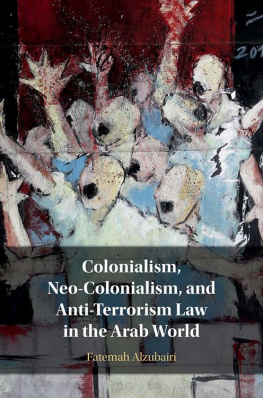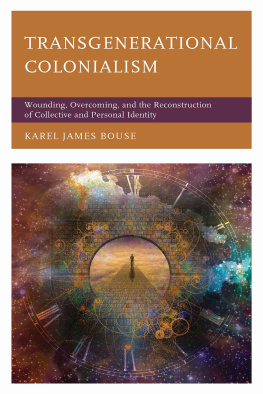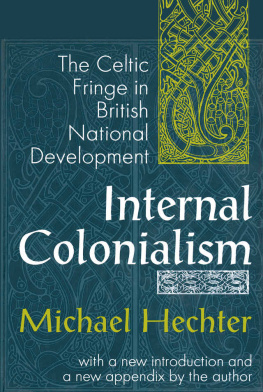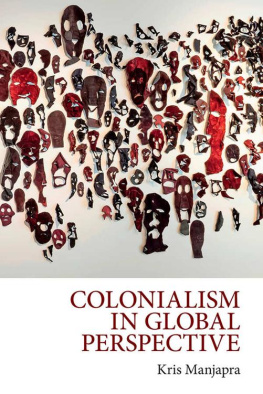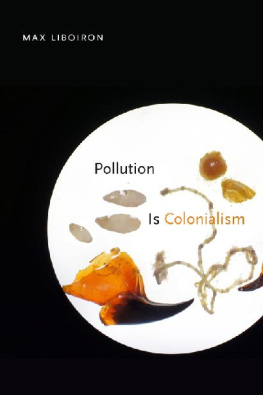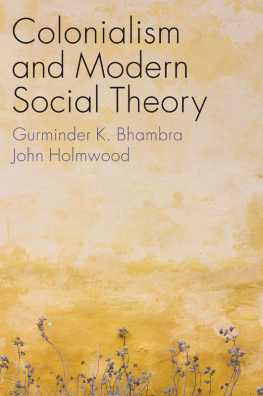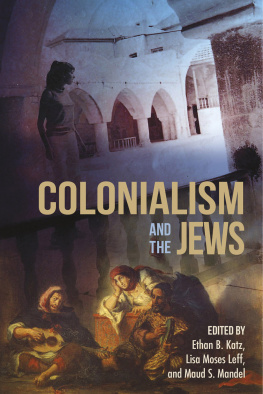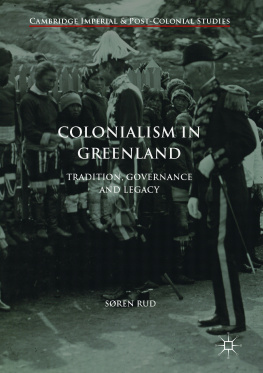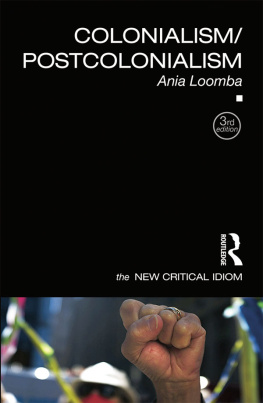Fatemah Alzubairi - Colonialism, Neo-Colonialism, and Anti-Terrorism Law in the Arab World
Here you can read online Fatemah Alzubairi - Colonialism, Neo-Colonialism, and Anti-Terrorism Law in the Arab World full text of the book (entire story) in english for free. Download pdf and epub, get meaning, cover and reviews about this ebook. year: 2019, publisher: Cambridge University Press, genre: Politics. Description of the work, (preface) as well as reviews are available. Best literature library LitArk.com created for fans of good reading and offers a wide selection of genres:
Romance novel
Science fiction
Adventure
Detective
Science
History
Home and family
Prose
Art
Politics
Computer
Non-fiction
Religion
Business
Children
Humor
Choose a favorite category and find really read worthwhile books. Enjoy immersion in the world of imagination, feel the emotions of the characters or learn something new for yourself, make an fascinating discovery.
- Book:Colonialism, Neo-Colonialism, and Anti-Terrorism Law in the Arab World
- Author:
- Publisher:Cambridge University Press
- Genre:
- Year:2019
- Rating:4 / 5
- Favourites:Add to favourites
- Your mark:
- 80
- 1
- 2
- 3
- 4
- 5
Colonialism, Neo-Colonialism, and Anti-Terrorism Law in the Arab World: summary, description and annotation
We offer to read an annotation, description, summary or preface (depends on what the author of the book "Colonialism, Neo-Colonialism, and Anti-Terrorism Law in the Arab World" wrote himself). If you haven't found the necessary information about the book — write in the comments, we will try to find it.
Colonialism, Neo-Colonialism, and Anti-Terrorism Law in the Arab World — read online for free the complete book (whole text) full work
Below is the text of the book, divided by pages. System saving the place of the last page read, allows you to conveniently read the book "Colonialism, Neo-Colonialism, and Anti-Terrorism Law in the Arab World" online for free, without having to search again every time where you left off. Put a bookmark, and you can go to the page where you finished reading at any time.
Font size:
Interval:
Bookmark:
Colonialism, Neo-Colonialism, and Anti-Terrorism Law in the Arab World
The threat of personal harm and destruction from terrorist attacks is nowhere near as great as in Arab nations. However, are counter-terrorism laws in the Arab world formulated and enforced to protect or oppress? Colonialism, Neo-Colonialism, and Anti-Terrorism Law in the Arab World examines the relationship between Western influence and counter-terrorism law, focusing on the Arab world, which is, on the one hand, a hostile producer of terrorist organizations, and on the other, a leader in countering terrorism. With case studies of Egypt and Tunisia, Alzubairi traces the colonial roots of the use of coercion and extra-legal measures to protect the ruling order, which are now justified in both the West and the Arab world in the name of counter-terrorism. Colonialism, Neo-Colonialism, and Anti-Terrorism Law in the Arab World provides important lessons for counter-terrorism, not just in these countries but also elsewhere in the world.
Fatemah Alzubairi is an assistant professor in the international law department at Kuwait University. She holds a PhD from Osgoode Hall Law School (2017), an LLM from the University of Toronto (2011), and an LLB from Kuwait University (2003). Her area of specialization is counter-terrorism from international and comparative perspectives, counter-insurgency, colonialism, and neo-colonialism. Between 2005 and 2008, Alzubairi worked as a lawyer in the Legislative and the Human Rights committees at the National Assembly of Kuwait.
Colonialism, Neo-Colonialism, and Anti-Terrorism Law in the Arab World
Fatemah Alzubairi
Kuwait University


University Printing House, Cambridge cb 2 8 bs , United Kingdom
One Liberty Plaza, 20th Floor, New York, ny 10006, USA
477 Williamstown Road, Port Melbourne, vic 3207, Australia
314321, 3rd Floor, Plot 3, Splendor Forum, Jasola District Centre, New Delhi 110025, India
79 Anson Road, #0604/06, Singapore 079906
Cambridge University Press is part of the University of Cambridge.
It furthers the Universitys mission by disseminating knowledge in the pursuit of education, learning, and research at the highest international levels of excellence.
www.cambridge.org
Information on this title: www.cambridge.org/9781108476928
DOI: 10.1017/9781108569262
Fatemah Alzubairi 2019
This publication is in copyright. Subject to statutory exception and to the provisions of relevant collective licensing agreements, no reproduction of any part may take place without the written permission of Cambridge University Press.
First published 2019
Printed and bound in Great Britain by Clays, St Ives plc, Elcograf S.p.A.
A catalogue record for this publication is available from the British Library.
Library of Congress Cataloging-in-Publication Data
Names : Alzubairi, Fatemah, 1982- author.
Title : Colonialism, neo-colonialism, and anti-terrorism law in the Arab world / Fatemah Alzubairi, Kuwait University.
Description : Cambridge, United Kingdom ; New York, ny , USA : Cambridge University Press, 2019. | Based on authors thesis (doctoral York University, Osgood Hall Law School, 2017) issued under title: The Role of Colonialism and Neo-Colonialism in Shaping Anti-Terrorism Law in Comparative and International Perspectives. | Includes bibliographical references and index.
Identifiers : lccn 2018034516 | isbn 9781108476928 (hardback) | isbn 9781108701761 (pbk.)
Subjects : lcsh : TerrorismPreventionLaw and legislationArab countries. | TerrorismPreventionLaw and legislationEgypt. | TerrorismPreventionLaw and legislationTunisia. | LawEgyptBritish influences. | LawTunisiaFrench influences.
Classification : lcc kmc982.t47 a5 2019 | ddc 344/.14927053257dc23
LC record available at https://lccn.loc.gov/2018034516
ISBN 978-1-108-47692-8 Hardback
Cambridge University Press has no responsibility for the persistence or accuracy of URLs for external or third-party internet websites referred to in this publication and does not guarantee that any content on such websites is, or will remain, accurate or appropriate.
To Toronto
I would like to start off by thanking Kent Roach, whom I consider my mentor in law and human rights. It is owing to his support as well as expert guidance that this book came into existence. His knowledge, wisdom, and love of humanity as a whole both inspired and enriched this book and my view of life. Special gratitude goes to Anna Ezekiel, who read and generously commented on the entire book, and whose useful feedback saved me from many errors. I would also like to thank Veit Hillside for all her insightful views and reassuring support, and Liora Salter, who through challenging me, enabled me to clearly build my ideas. I greatly benefitted from the Middle East expertise of Sabal Alnasseri and from Jenny Hockings criticism of counter-terrorism as counter-insurgency, which inspired this book. A number of colleagues and friends have influenced and made valuable comments on countless issues in this book. I thank Ghanim Al-Najjar, Rashid Al-Anezi, Domingo Lovera Parmo, and Stefanie Crispino. John Berger at Cambridge University Press has enthusiastically supported me in completing this book and has shown great competence in seeing it through the press. Discussions with my students have mirrored a mixture of disappointments on regional and global security and a desire for a brighter future. Their sense of hope highlights the importance of studying the roots and developments of counter-terrorism laws in order to make a difference. Last, but surely not least, I am grateful to my parents, Fakhriya Alharbi and Hussian Alzubairi, for their ongoing encouragement and love.
This book investigates the link between colonialism, neo-colonialism, and counter-terrorism, particularly in the Arab world. The book focuses on the colonial rationale for crime control in the arena of national security, and the development of this logic within Egypt and Tunisia during and after colonialism. The unique contribution of this book is its attention to the connections between colonialism, neo-colonialism, and counter-terrorism. These connections have implications for global security in general, because they reveal the colonial roots of the use of coercion and extra-legal measures to protect the ruling order, which are currently justified in both the West and the Arab world in the name of counter-terrorism. Using case studies of Egypt and Tunisia, the book argues that colonialism has had a crucial impact on shaping postcolonial legal and penal systems, which include counter-terrorism laws and policy. In addition, colonialism affected the neo-colonial distribution of power, in which the West as well as Russia dominates the global war on terror, in particular through the United Nations Security Council. States have responded to the United Nations (UN) promotion of anti-terror laws by broadening their laws regardless of their usefulness in crime control. As a result, global anti-terrorism approaches focus primarily on security at the expense of the progress of democracy or human rights, especially within the postcolonial world.
The recent executive orders by the President of the United States, Donald Trump, which ban people of particular nationalities from entering the United States, reveal that the use of arbitrary measures is not exclusive to authoritarian countries like those in the Arab world. The global tendency to normalize this kind of exceptionalism in anti-terrorism practices suggests a meeting point between the West and the Arab world in terms of using counter-terrorism legislation to cement power. This book studies the roots of these practices in colonialism, and the way colonialism continues to play out in counter-terrorism legislation in the Arab world, with lessons for the West as well.
Font size:
Interval:
Bookmark:
Similar books «Colonialism, Neo-Colonialism, and Anti-Terrorism Law in the Arab World»
Look at similar books to Colonialism, Neo-Colonialism, and Anti-Terrorism Law in the Arab World. We have selected literature similar in name and meaning in the hope of providing readers with more options to find new, interesting, not yet read works.
Discussion, reviews of the book Colonialism, Neo-Colonialism, and Anti-Terrorism Law in the Arab World and just readers' own opinions. Leave your comments, write what you think about the work, its meaning or the main characters. Specify what exactly you liked and what you didn't like, and why you think so.

